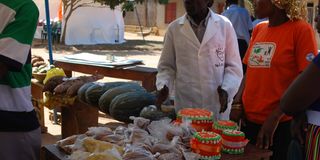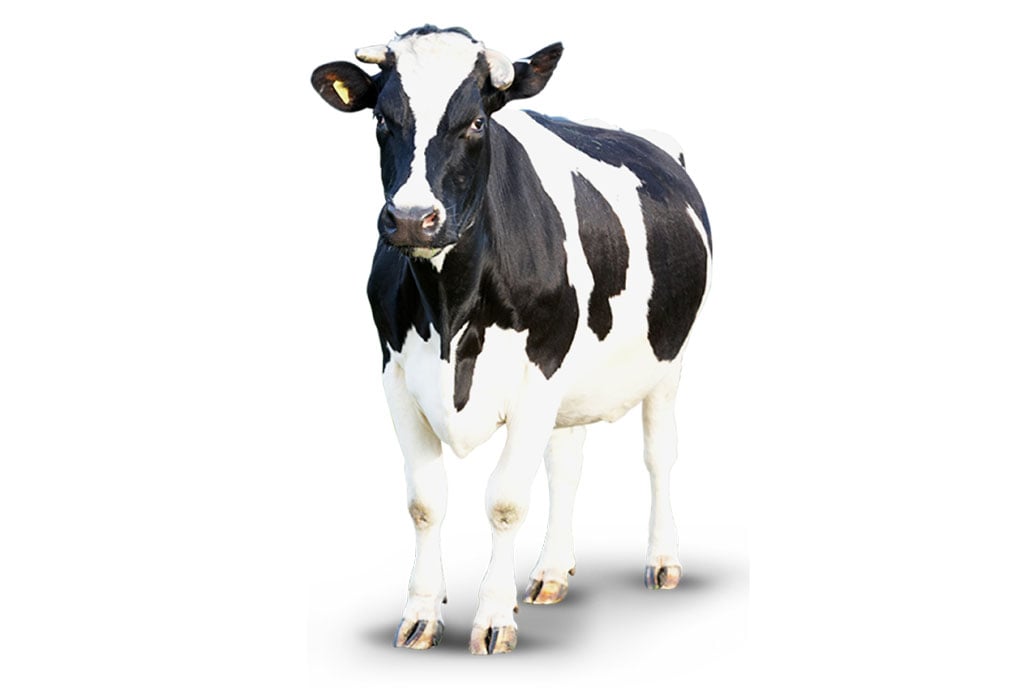Kasekende’s money grows on orange sweet potatoes

Cakes and chapattis made out of bio-fortified orange fleshed sweet potatoes on display at a farmers’ field day. PHOTOs/Michael J Ssali
What you need to know:
Joseph Kasekende who is now recognised orange fleshed bio-fortified sweet potato vines multiplier in the entire region takes credit for introducing bio-fortified orange fleshed sweet potatoes in the area.
Growing bio-fortified orange fleshed sweet potatoes is a major source of income and nutritional food for scores of households in Binyonyi Village, Kalisizo Rural Sub-county, Kyotera District and even beyond.
Ms Justine Ssenyomo, chairperson of Good Life, a women’s group of farmers that grow bio-fortified orange fleshed sweet potatoes at Binyonyi and the neighbouring villages, said since 2017 untill early last year when Covid-19 broke out, the group members have been earning money every week by selling the potatoes to schools and to an exporter who took them to Dubai. Ssenyomo further told Seeds of Gold, “The exporter bought two metric tonnes every week and the schools suppliers would buy whatever quantity that was available and whatever size of potatoes. The exporter as a rule bought only potatoes that weighed between 250 and 800 grammes. However due to Covid-19 she has not been exporting any potatoes to Dubai, UAE and the schools have not yet fully reopened.”
“So most of the time during the lockdown we have suffered a big decline with regard to regular income. However we have sufficient highly nutritive food to eat in our families and, besides that, orange fleshed sweet potatoes are good fodder for farmed animals like pigs, goats and cattle. We have also been taught to make cakes and chapattis out of orange fleshed bio-fortified sweet potatoes which we sell,” she says.
Invests money
She said that with the money she earned from the weekly sale of the orange fleshed bio-fortified sweet potatoes she has been able to buy about an acre of land on which she has planted cloned Robusta coffee.
“A lot of the women in our group have made even better achievements than I have but we owe them all to our fellow farmer and resident at Binyonyi Village, Mr Joseph Kasekende, who introduced the orange fleshed bio-fortified sweet potatoes. He is the kind of man that wants to share good ideas with his friends in the neighbourhood. ”
How Kasekende started
Kasekende who is now the recognised orange fleshed bio-fortified sweet potato vines multiplier in the entire region, takes credit for introducing bio-fortified orange fleshed sweet potatoes in the area.
A trained agriculturist himself, Kasekende, now aged 54, ventured into farming 10 years ago after buying land in Binyonyi Village. “There was a worldwide recognition that malnutrition was rampant especially in developing countries such as Uganda,” he told Seeds of Gold. “Most people could not access fruits and vegetables that provide essential nutrients such as Vitamin A, Zink and Iron in their everyday diet and there was an effort to reverse that position by enabling poor people to receive the nutrients through the common food crops available to them such as sweet potato and beans. There was a marked decline in sweet potato production in the region and the entire country due to some viral sweet potato diseases that had no cure especially Sweet Potato Virus Disease (SPVD),” he said.
Testing
Working with Dr Sam Namanda a researcher from International Potato Centre (CIP), Kasekende started with trials by testing clean sweet potato vines against unclean ones for a period of three seasons (between 1st season of 2014 and 1st season of 2015).
He experimented with two varieties of sweet potatoes, Ejumula from Teso region and Kakamega from Western Kenya, to find out how resistant they were to the common viral diseases that had originally attacked and reduced sweet potato production in the region.
In just one and half years all the potatoes were attacked and destroyed by disease and there was need to get new vines to plant. Both of the varieties were orange fleshed and rich in Vitamin A.
“It was important to get clean, disease-free planting materials and we had to resort to tissue culture laboratories to get these. We approached two private tissue culture laboratories, SENAI Tissue Culture Lab and Bio-crop Tissue Culture Lab which developed the different bio-fortified orange fleshed sweet potato varieties ranging from Naspot 8, Naspot 9, Naspot 10, Naspot 11 and Naspot 13,” he said.

Kasekende tends to crushed bio-fortified sweet potato chips drying under the sun for making fodder.
Tissue culture
He went ahead to reveal that after the tissue culture laboratories came up with the tissue culture plantlets, they had to be approved by National Agricultural Research Organisation (Naro) to ensure that they were entirely disease-free. “It was around that time that CIP left and through Community Enterprise Development Organisation (Cedo) introduced the sweet potato vine multiplication project to HarvestPlus, which assisted us with the Insect Proof Screen Nets to ensure that the newly arrived bio-fortified sweet potato plantlets did not get attacked by any crop disease causing insects.” Harvest Plus organised some training sessions for local farmers in good crop management practices right here on my farm.
Upon arrival here they are placed inside the Insect Proof Screen Nets for weeks before transplantation in the parent garden. It is from the parent garden that Kasekende gets the vines for sale to interested farmers. “In the beginning it was not easy to sell them since not so many farmers clearly understood their nutritive value,” he says.
He says most people in the Buganda region were traditionally accustomed to getting free sweet potato vines from fellow farmers. Potato vines were never sold. Secondly, the orange fleshed sweet potato which has low dry matter content, was not as palatable as was the traditional and commonly consumed white sweet potato that has high dry matter content (akumuuka).
“Fortunately since I am also a coffee farmer I took advantage of the fact that most farmers in the area including women belonged to our coffee farmers’ group, Miti Coffee Farmers Field School. I decided to donate some orange fleshed sweet potato vines to the women to plant. I also talked to them about their big nutritional component and why pregnant women and children should eat the potatoes. At the local health centres where the women went for maternity care the midwives and nurses lectured them about the importance of Vitamin A in their diet and that it was available in the orange fleshed bio-fortified sweet potatoes, if they could eat them.”
Big demand
“The demand for the vines suddenly shot up and I have since then almost been overwhelmed by the orders placed for the orange fleshed sweet potato vines. The women found production of the potatoes so paying that many of them have now bought their own land and planted coffee in addition to the potatoes which until the Covid-19 pandemic broke up have been highly demanded for by exporters and educational institutions.”
Best practices
Due to vulnerability to viral diseases it is not recommended for farmers to freely pass on vines to fellow farmers as used to be the case before. The farmer has to purchase fresh planting material every season.
Kasekende also has to keep getting new plantlets regularly from the tissue culture laboratories. Time and again his sweet potato mother garden is inspected by officials from the Ministry of Agriculture Animal Husbandry and Fisheries (MAAIF) to ensure that it is disease-free.
“Anyway the sweet potato parent garden for vines should not last beyond nine or 10 months. By that time it is exhausted and the potatoes underneath are no longer good for human consumption. I then harvest them, chop them up, dry them on clean tarpaulin sheets before crushing them into flour for the pigs and cows to eat.”




